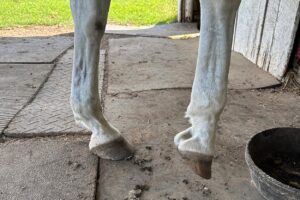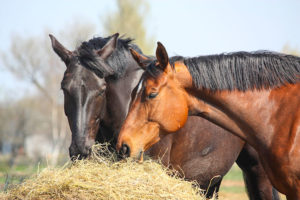Latest News – The Horse

The Abscess Ruptured, But My Horse is Still Lame. Now What?
Follow these steps when your horse has an abscess that lingers beyond typical treatment times. Read more in the Spring 2025 issue of The Horse.

Vitamin E Supplementation for Horses
Horses need the essential nutrient vitamin E for proper muscle and cell function. Here’s how you can be sure you’re meeting their requirements.

2 EHV-1 Cases Confirmed in Ontario
The horses lived in the Regional Municipality of Niagara and were euthanized.

2 Ontario Horses Test Positive for Strangles
The horses live in Grey and Dufferin counties.

Fifth EHV-1 Case Confirmed at Pennsylvania Boarding Facility
A fifth horse has tested positive for EHV-1 at a boarding facility in Montgomery County.

Understanding Jamestown Canyon Virus in Horses
Although horses have long been exposed to the virus, its rare detection in a Pennsylvania horse is not currently a reason for concern.

Will Whey Protein Improve My Horse’s Topline?
An equine nutrition expert addresses toplines, horse protein needs, and if whey is the way to go.

Can My Horse Eat Hay with Preservatives?
Although researchers have shown horses prefer untreated hay, it is safe for horses to eat hay treated with preservatives. An equine nutritionist explains why.

Creating the Right Diet for Your Horse
Your horse’s nutritional requirements depend on his life stage and individual needs.

Understanding and Managing Quarter Cracks in Horses
An equine veterinarian describes why uneven pressure on the hoof can cause quarter cracks and how farriers can manage them using corrective trimming and shoeing.

Rehabilitating Soft Tissue Injuries in Sport Horses
An equine sports medicine expert describes her ideal rehab plan for sport horses with soft tissue injuries and solutions for managing the uncompliant patient.

The Horse’s Microbiome: A Key Player in Nutrition, Health, and Behavior
These days it’s hard to talk about equine nutrition and not mention the term ‘microbiome.’ But what exactly is the microbiome?

2 Michigan Horses Test Positive for Strangles
The horses live in Kalamazoo County.

4 EHV-1 Cases Confirmed at Pennsylvania Boarding Facility
The equine herpesvirus-1 cases were diagnosed at a facility located in Montgomery County.

Functional Assessment of Horses With Back Pain
Even with better diagnostics and treatments, hands-on exams and movement assessments remain essential for finding the source of back pain in horses.

What You Need to Know About Equine Degenerative Joint Disease
Listen to this Ask TheHorse Live podcast episode and hear what 2 experts say about equine degenerative joint disease. Sponsored by American Regent Animal Health.











